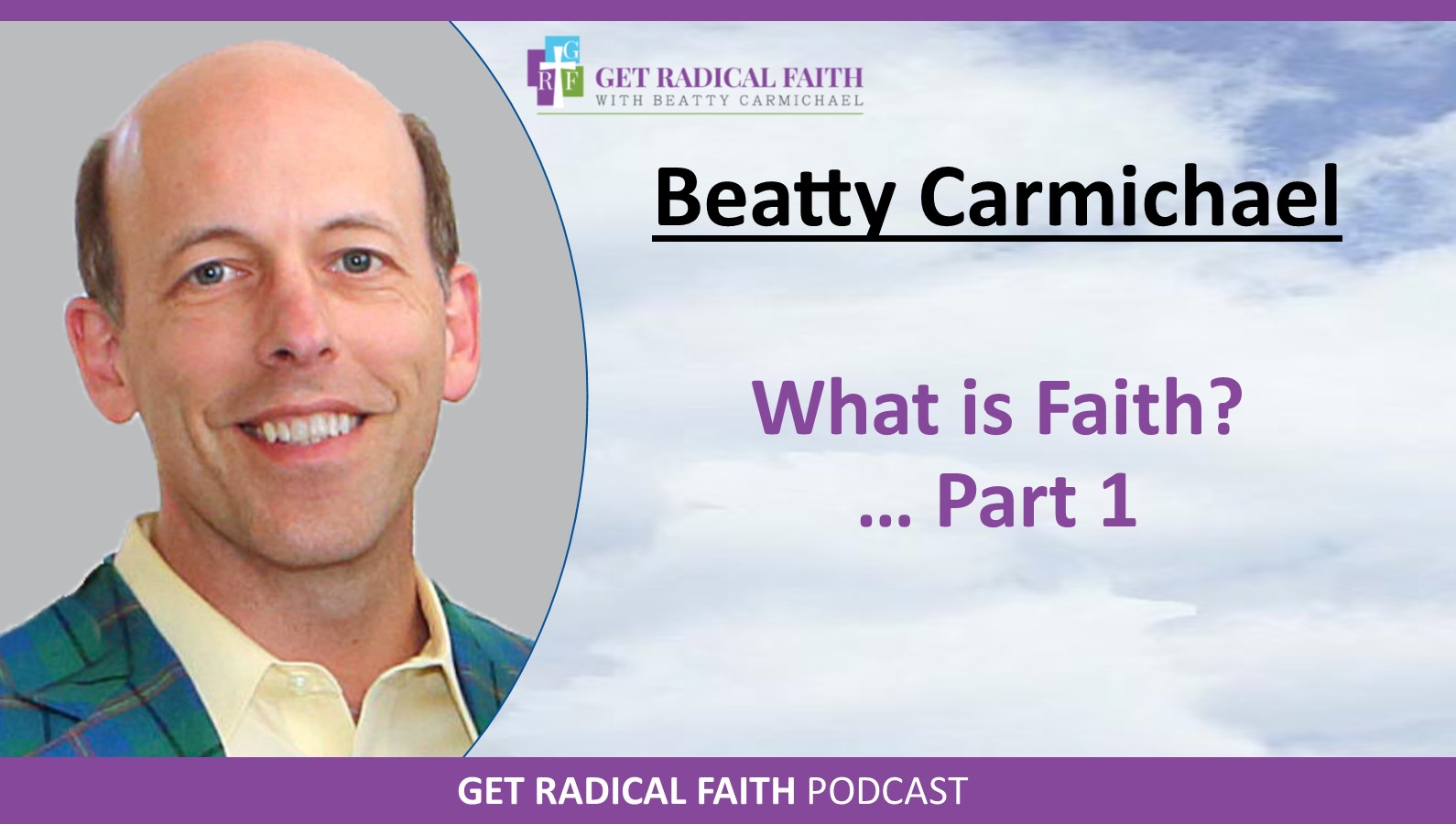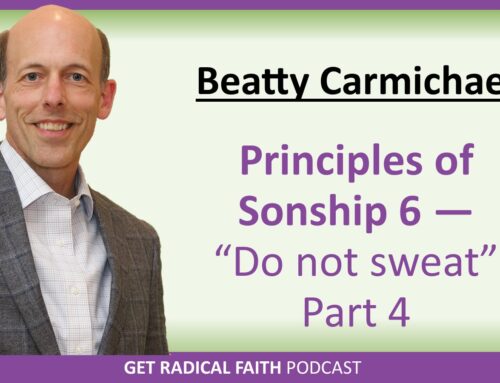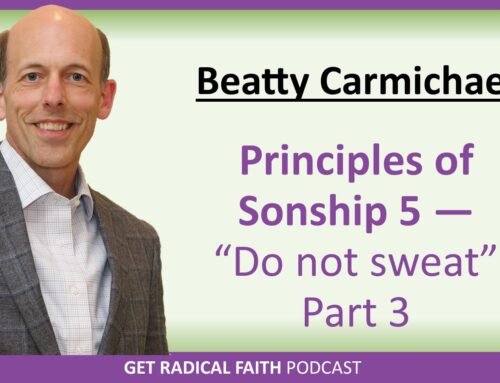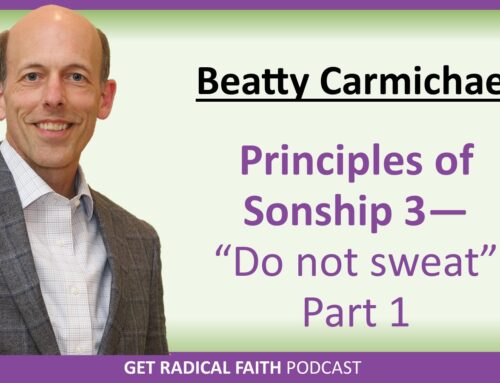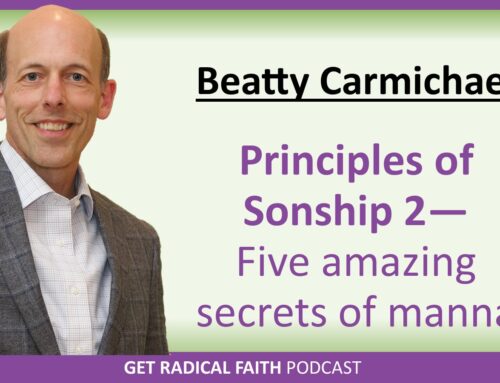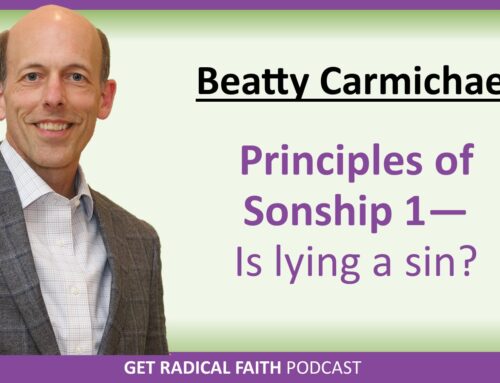Radical Faith – What is Faith – Part 1
Caroline: Hi Everyone. This is Caroline Springer and welcome to the next session of Get Sellers Calling You with Beatty Carmichael. This is one of our Radical Faith calls and Beatty, would you like to share what your vision is and what that means.
Beatty: Yeah, I appreciate that. I’d love to. As you know, we do these marketing calls on real estate marketing all the time, but I’m also a Christian businessman, so I’d like to periodically do some calls we call Radical Faith which is from a Christian perspective. We announce these calls up front. This is a Radical Faith call so if you don’t have any interest in Christianity, if you don’t want to hear my views on living for the Lord, then we let you know up front so you can press delete on this podcast audio and not listen to it. Now, you are forewarned.
Today, what I want to talk about is kind of digging deep into what it means to live by faith and how does the Lord start to providentially or miraculously work at times in your life when you do. That’s the direction I want to take today’s call.
Caroline: Oh, well great. I’m excited to explore that. I know that’s something that my husband and I have received a lot from the Lord as well, just in our marriage. So, I’m excited to hear your thoughts and experiences and just receive your wisdom.
Beatty: Well, I appreciate that. Hopefully, it’s wisdom. We’ll see. Oh, no, I’m teasing on that. What is it, to share the Lord is the beginning of wisdom. There is some wisdom in here because I’m sharing the Lord. I want to kind of get started and I just kind of set the stage for those of you listening in. Normally, I provide an outline of the call to Caroline so she can follow. On today’s call, I provided nothing. So, she is absolutely clueless as to what direction this is going. None of this is premeditated or pre-rehearsed for Caroline. We’re going to put Caroline on the hot seat some of these times and see where she is.
I want to start off with three boxes. I want you to visualize three boxes. One box is going to be about the size of a jewelry box, a small box maybe like what you’d put a ring in. Box number two is a little bit larger box. It’s probably like an Amazon box when you order something and here it comes, that Amazon box stuck on your front door. For the third box, I want you to think of a great big box, like a moving box, but I want you to imagine taking a knife and slicing down the edges of the box so that all of the sides of the box lay flat. In other words, there’s not structure to the box. It’s just a flat piece of paper. I’ve just got to ask you, Caroline, what do those three boxes represent?
Caroline: Oh, my goodness. Let’s see where you’re going. Maybe just the amount of faith that you have in the Lord. What can you place in each of those?
Beatty: Bingo!
Caroline: That’s what they represent.
Beatty: You’re dead on. I’m impressed. This is how most of us as Christians live our lives. We place God in a box. The size of the box is the size of our faith if we just want to use that as a very simple term. What that means is if I’m the jewelry box size person, I’m going to trust the Lord when I have to travel from one city to another. I’m going to trust that the Lord is going to take care of me. But, when times get tough, I start to get afraid because, oh my gosh, we’ve got all these bills and we’re not making any sales right now. It’s a down time in the real estate market and you start to get afraid because your God isn’t big enough to take care of your needs.
Then you have the Amazon box size person. That person isn’t going to be as rattled as the jewelry box person. You go through down turns economically and you hold strong by faith. Then, something else happens. Maybe you have no money coming in and you got maybe six months of savings left and that’s it and you feel in your spirit the Lord telling you to give all of your savings away to this ministry. Now, you start to panic. You’re happy, you’re okay trusting the Lord, but you know you got that safety net or that savings account. So, now, you start to question. Well, did I really hear the Lord? Is that really what he wants me to do? I’m not sure I can do that. That’s the Amazon box size thinking person.
Then you look at the moving box where you slice the edges out and you lay it flat and there are no limits to your God in that case. That’s the type of person that when you get that command, you know, give all your money away. You’ll go, okay, and you have no fear.
The question is which of those three boxes represents your God and your faith. What I want to do is I want to walk us through what faith really is at a very simplistic approach and walk us through kind of how do you go from being that jewelry box person to that moving box without any sides. How do you take that leap of faith, if we want to use that terminology and actually start to trust the Lord? First, I’ve got a question and since Caroline, you’re my guinea pig on this one, let’s see where you are. Is faith active or passive?
Caroline: Active, absolutely. I mean, I think the world might even try to argue that it’s passive but faith is an invitation to trust. Faith is an action of letting go of our natural human concern and choosing to trust the Lord.
Beatty: That’s exactly right. I think what James says, so, you say you have faith, but I will show you my faith by my works. In other words, I’m going to act it out and show it to you. So, you’re right. Faith displays itself through our actions. I want to challenge you guys on the call to experience the Lord in a new way, to seek him in a new way and to see him really work in an amazing way in your life that maybe you haven’t seen before.
I will probably tell a lot of stories as we go along. What we’re going to do is actually a whole series that we will end up completing over time, step-by-step, taking it one step at a time. I want to talk first, real quickly, about why we should live by faith. What does the Bible say?
Here are four statements that I’d like to suggest about faith because these are maybe some misnomers. You can live a nice, clean, moral life without any faith. Living by faith is not living a clean life. It’s not living a moral life because Jesus even rebuked the Pharisees of the day who lived a clean, moral life and he rebuked them for their lack of faith. Faith has nothing to do with living a moral life. It is part of it, but it has nothing to do with it. James says, that apart from faith, we can receive nothing from God. This is James 1: 6-7 and it says, “But we must ask in faith without any doubting, for the one who doubts ought not to expect that he will receive anything from the Lord.” Here’s a question, why should we not to expect to receive anything from the Lord if we doubt? Has it something to do with faith? Question for you, Caroline. Jesus primarily rebuked his disciples and his apostles for one thing, do you remember what that one thing is?
Caroline: Their lack of faith.
Beatty: Yeah, their lack of faith. It wasn’t their short comings. It wasn’t their mistakes. It wasn’t all these other things with the exception of one exception that I know of. Every rebuke Jesus gave his disciples and his apostles was, oh, ye of little faith. If it’s so big primarily that Jesus ever rebuked his disciples about, then we ought to take notice and kind of understand what this is.
The last statement I want to make is faith is essentially the act of believing God’s words. Praying in faith is the act of submitting that faith of action before the Lord. It’s when we act by faith and we pray by faith, that’s when we start to receive God’s promises, God’s provisions, in a mighty way. As James says, without faith we shouldn’t expect to receive anything.
I wanted to turn real quick. I know you’re probably driving down the road so you can turn in your Bible, but let me give you the reference. It’s Mark 11:22 and this is Jesus talking, and he says, “Therefore I say to you, all things which you pray and ask, believe that you have received them and they shall be granted you.” Here’s my question. Why is that? Why are we to believe that we’ve received them, which is past tense, believe that we’ve already received, and then he says, “then they shall be granted you” future tense? So, we’re to believe in the past tense that we’ve already got what we’ve asked for and then in the future tense it’s actually going to come to us. Have you ever pondered that, Caroline?
Caroline: I actually haven’t from that past versus future tense. I’m familiar with that verse and I like to look at it as an invitation for our mind to be renewed and for us to think like the Kingdom, or the way that the Kingdom thinks, because the way that Jesus invites us. He says, the only way we can enter the Kingdom is if we have faith like a child. So, just in that kind of mindset, I look at my son and he doesn’t ever question whether he’s going to be fed or things like that. It’s just that he knows. It’s just in the fiber of his being. In the command in Mark, I think with what you’re saying about the past versus future, I think just having that foundational trust of never questioning or doubting. Just knowing. Believe that it’s already happened. I don’t have to think about it. That’s the invitation. I love what you’re pulling out of that, the past versus present or future. That’s my interpretation of just having such a trust; you don’t even think about it. It’s just going to happen.
Beatty: It’s actually more than that. Let’s talk about it for a moment and this one session may turn into two sessions as typically happens with me. Let’s lay a foundation. Who modeled the perfect Christian life for us?
Caroline: Jesus, absolutely.
Beatty: Did Jesus do anything that was not already done in Heaven? In other words, when Jesus says, I only do the thing I what? Can you complete that sentence?
Caroline: I’ve seen my Father do.
Beatty: That’s right. I’ve only do the things I’ve seen my Father do. Were those things done in the past or in the future that his Father did?
Caroline: I guess in the past if he’s saying he’s seen his Father do them.
Beatty: Okay, so watch this. Jesus only did what He saw his Father do which means His Father did them first and we know it happened in the Heavenly realm and so now, Jesus does them second in the Earthly realm. Jesus knew they had already been done and then he did them. If we convert this into prayer, we believe that we’ve already received them, past tense, Heavenly realm, and then they shall be granted us, future tense, Earthly realm that Jesus did. Does that make sense?
Caroline: Absolutely. I love that. Pulling out that explanation, I think that’s huge. Thank you.
Beatty: We see this again twice in Matthew. Jesus said, whatever you bind on Earth will be bound in Heaven, but the better translation, the more accurate, whatever you bind on Earth shall have been bound in Heaven. Whatever you lose on Earth shall have been lost in Heaven. In other words, what we do on Earth is a mirror of what’s already been done in Heaven. So, when we pray, believing that we’ve received, what we’re doing is that we’re praying, in Jesus’ name, by His authority, which means that it has to be by His will and we’re praying that we receive what’s already ours. Pray that we’ve received it and it shall be granted you. Anyway, we’re digressing again, but does that make sense? We’ll probably get into that a little bit later in another one of these calls.
Caroline: No, that does. I like it. I love the tangent stuff.
Beatty: So, we’re going to probably hit a lot of tangents as we go through this because it’s just so much fun. Now we’ve got these, what I call the four simple statements of faith. It’s not about living a moral life, but it is about acting on God’s word and praying in faith on God’s word, praying that He’s going to do it because we pray by His authority. The simple prayer that Jesus taught us in terms of the process of how we pray. Pray like this: Father, that your will be done on Earth as it is or as it is already done in Heaven. So, we see all this understanding that it’s already done in the Heavenly realm. What we’re praying and what we’re doing is manifesting it in the Earthly realm. That’s why you see all this stuff that Jesus says, believe that you’ve already received it and it shall be yours.
Then, the question comes up, why do we live by faith? Well, Romans 1 tell us that the righteous man shall live by faith. It’s not that he shall be by faith which is passive. It’s that he shall live by faith, so we have an active statement. Luke 18 says, this is Jesus talking, and he says, “However, when the Son of man comes, will He find faith on the Earth?” Why do you think Jesus said, will He find faith on the Earth rather than will He find people loving the Lord on the Earth? Will He find goodness and love overcoming evil? Why do you think, Caroline, that He said, when the Son of man comes, will He find faith on the Earth? That’s all He’s looking for.
Caroline: I think, like you said at the very beginning of the call, you can live a good and moral life outside of faith. You can live a, quote, good and moral life even apart from Jesus. So, the invitation for faith is not just to live a good life, it’s to live the life He envisioned for us. It’s to live the life of faith and the life of trust and receiving our position as sons and daughters. I think it’s an invitation beyond that, like those examples you were just saying.
Beatty: Yeah, it’s a big invitation far beyond that. That’s what we’re hopefully going to uncover as we go forth. Luke 22, Jesus shows another thing. What I want you to understand is this is super important to the Lord. When I return, am I going to find faith on Earth? Luke 22 says, “But I have prayed for you that your faith may not fail.” It’s so important that He’s looking for it when He returns. So important that He prays that it will not fail. There is something so significant here that this is the one thing that Jesus is focused on. Yet, most of us never think of it in those terms, as being that one thing that Jesus is really focused on. This is why I think we need to focus on it ourselves because it’s just such a big deal. Jesus keeps making it a big deal all throughout scriptures and yet, so frequently, we kind of gloss over it and I think we gloss over it because we don’t really understand it. Now, I want to. So let’s test your scripture memory, Caroline. What does the Bible say that faith is? Do you remember?
Caroline: Oh, gosh. Faith is, oh, something about not being seen or unseen. Why is this so much better, the scripture is just escaping me?
Beatty: Oh, I’m catching you off guard. I apologize. I don’t want to embarrass you. I’ve got it obviously because I’ve got my Bible in front of me and my notes that I’m working off of. This is Hebrews 11:1. Now faith is the assurance of things hoped for. The conviction of things not seen, but I want to read it in a slightly different translation. This comes from The Amplified Bible, and I want you to try to grasp what this really is all about. It says faith is the assurance or the title deed of things we hope for. Now, by the way, hope, in the Bible is different than the word hope in the secular realm. When you and I say hope in our vernacular, we’re saying like, oh, I hope it doesn’t rain today. Meaning, I really desire that it not rain today. That’s not the way the Bible uses the word hope. In the Bible, when the word hope is used, it is an absolute certainty of what is coming in the future. So, we can’t say that this is something we hope for, meaning that we desire but we’re not really sure about it. In Bible terms, hope is an absolutely certainty. That’s what this is saying. Faith is the title deed or the absolute certainty of things we hope for.
Title deed. Let’s talk about that real quick. I’ve got the title deed to my automobile. What does that mean?
Caroline: It’s your proof of ownership.
Beatty: That’s it. It’s my proof of ownership. Faith is the title deed of those things that have been promised. It is the proof of ownership. It means it is yours. That’s what this is talking about. Faith is the title deed, the proof of ownership of things that are yours. It’s the proof of things we do not see and the conviction of the reality. Faith is perceiving as real fact of what is not revealed to the senses. This concept of faith is perceiving of real fact what is not perceived by the senses. Do you have faith, Caroline, that radio waves exist?
Caroline: Yes.
Beatty: If we were to use that terminology, faith in this, do you have faith, are you acting by faith right now on this phone call?
Caroline: Yes, I would assume so just because I know that when I dial in that those waves are going to transmit.
Beatty: You’re on your cell phone, right?
Caroline: Yes.
Beatty: You’re acting by faith because your cell phone is using radio waves you cannot see but you know for an absolute certainty that they exist. And this is faith in the Bible. We cannot see it, but we know for an absolute certainty that they exist. The reason we can’t see it is because it’s the promise of God. It’s the truth of God. It’s the things that are already done in the Heavenly realm and we’re praying for them to be done in the Earthly realm. I digress a little bit from my notes, so let me go back. The question, then, is, how does this manifest itself in the scriptures? I can tell, right now, we will not make it through on today’s call keeping it at 30 minutes. How much time do we have? What’s our clock right now?
Caroline: It is 12:25 right now, so we’ve got about five minutes.
Beatty: Did we start right at 12 our time or do you recall how much time we have on this podcast?
Caroline: We started maybe five after.
Beatty: Okay, so we’ve got probably 8 or 10 minutes, so let’s see where we can go. Let’s look at faith in the Bible and kind of understand what faith is doing within Biblical times and we can start to understand, maybe, as we move in this direction, how it starts to impact in our lives.
I want to talk first about Moses parting the Red Sea; this is in Exodus Chapter 13. I’m going to just kind of skip around a little bit, but just read this one second. It says, “And the Lord said to Moses, why are you crying out to me?” So here’s the background. God has just led Moses and the children of Israel to a dead end, right against the Red Sea. Then, here comes the Egyptians with Pharaoh and all the people get afraid and they start to cry out to God. This, I would say, is either the jewelry box God or possibly, for some of them, the Amazon box God, but not at all the moving box with the sides cut out. And so they’re crying because all they see in the natural is oh, my gosh, total destruction. Moses comes to the Lord and we ascertain from this that Moses is also concerned. He’s not concerned to the same degree as the rest of the people, but he’s pleading with the Lord. Here’s the Lord’s response. “Why are you crying out to me? Tell the sons of Israel to go forward.” Which direction is forward, Caroline?
Caroline: That seems kind of like a trick question. I mean, forward?
Beatty: Straight into the Red Sea, right?
Caroline: Right.
Beatty: So, God is telling them, “Hey, stop crying out to me, move forward, and straight into the Red Sea.” Now that makes no sense. This is where faith comes in, okay. And then God says, “As for you, lift up your staff and stretch out your hands over the sea and divide it and the sons of Israel shall go through the midst of the sea on dry land. Then, Moses stretched out his hands over the sea and the Lord swept back the sea by a strong east wind all night and turned the sea into dry land so the waters were divided.” So, here’s a question. Who acted in this story?
Caroline: Moses did.
Beatty: Yep. Moses acted and did he see before he acted?
Caroline: No, he let his faith be his eyes.
Beatty: Yeah and right. Moses acted before he could see, but why did he act?
Caroline: Because of his faith and his trust in the word that the Lord had given him.
Beatty: That’s right. He acted by faith in the Lord’s truth or in the Lord’s command and then who performed?
Caroline: Oh, you mean like for the outcome?
Beatty: Uh huh.
Caroline: The Lord.
Beatty: Okay, so now we see this pattern throughout. Man acts before he can see, but he acts on the clearly defined will of God and then God performs. That’s the pattern of God moving in one’s life providentially and miraculously.
Let’s look at another story. This is Elijah and the widow. So, the backstory on this is this is during the reign of King Ahab. King Ahab is a wicked king. Elijah has gone to him and said, “You’re so wicked and until you change, I’m going to call for a drought on the land.” So, he calls for a drought on the land. There’s no rain. Everything’s drying up and then God takes care of Elijah with some ravens who bring him food and he’s by a brook and the brook dries up and now we pick up in I Kings 7. This is God now speaking to Elijah. “Arise. Go to Zarephath, which belongs to Sidon. This is outside of the Israeli territory, and stay there. Behold, I have commanded a widow there to provide for you.” Now, let me ask you a quick question. I love this part of the story. Now, you’re familiar with this story that we’re going into, is that right Caroline?
Caroline: Yes, I am.
Beatty: Okay, so he said, behold I have commanded a widow there to take care of you. Do you think that widow knew anything of that command?
Caroline: No, I would assume not.
Beatty: Okay, so here we have the spiritual world intersecting with the Earthly world. God has commanded, past tense, and she knows nothing about it. This is where when we pray and act, we pray believing that we’ve already received it, because it’s already been done, and then it starts to happen. So, God has commanded a widow, but the widow knows nothing about the command. So that command had to have occurred in the spiritual realm, in the Heavenly realm, where she does not have the sensory to recognize it. Elijah arose and went to Zarephath and when he came to the gate of the city, behold, a widow was there gathering sticks and he called to her and he said, please get me a little water in a jar that I may drink. As she was going to get it, he called to her and said, please bring me a piece of bread in your hand. But she said, “As the Lord your God lives, I have no bread. I only have a handful of flour in a bowl and a little oil in a jar and behold, I am gathering a few sticks that I may go and prepare for me and my son that we may eat it and die.” Then Elijah said to her, now here is the word of the Lord, Elijah said to her, “Do not fear, go do as you have said, but make me a little bread cake from it first and bring it out to me and afterward you may make one for yourself and for your son. For thus says the Lord God of Israel. The bowl of flour shall not be exhausted and the jar of oil shall not be empty until the day that the Lord sends rain on the face of the Earth. So she went and did according to the word of Elijah and she and he and her household ate for many days. The bowl of flour was not exhausted nor did the jar of oil become empty according to the word of the Lord which he spoke through Elijah.” Okay, so now we have this story, we have this backdrop. Question. Who acted in this story?
Caroline: The widow acted.
Beatty: Right. We actually have two people that acted. We have the widow who acted and then we also have Elijah who acted. Did they see before they acted?
Caroline: No. They allowed their faith to be their eyes.
Beatty: That’s right. So, Elijah went to Zarephath without knowing anything other than by God’s command. The widow trusted the word of the Lord and did what was said. So, why did they act? They acted without seeing, so why did they act?
Caroline: Again, just letting their faith, putting their trust in the word of God and putting their trust in that and letting that be their eyes and be what overtook some of their fleshly concern and not seeing it. So, putting their faith and their trust in that and not physical trust.
Beatty: They acted because of the word of the Lord and they trusted that Word and then who performed?
Caroline: The Lord.
Beatty: There you go. So, we’ve got the same pattern. Man acts before he can see but he acts because of the clearly defined will, or word, or command of the Lord, whatever you want to use it and then it’s the Lord who produces the results.
Here’s something interesting that we also get out of this. Notice that the widow was to honor the Lord first. Elijah is the Lord’s representative and Elijah said, make me a bread cake from it first and then go back and make one for you and your son. So, we have this other truth that is weaved into this story and that truth is that the Lord wants us to always honor him first with all that we have. This is where we have the tithe, the first fruits, all these truisms of the Lord and how he sets us up because the Lord wants us to, not only honor Him, but trust Him first. What do you think would’ve happened if the widow made a bread cake for her and her son and then used whatever was left over for the Lord. What do you think would’ve happened then?
Caroline: Well, I mean, I’d like to think that the Lord, I guess we don’t really know. I guess they wouldn’t have seen the abundance that they saw.
Beatty: Okay, so let me ask it this way. Was it an act of faith to give the little bit of food she had first to the Lord or would it have been an act of faith to feed herself first and then give away anything left over to the Lord?
Caroline: Right. I mean it would’ve been an act of faith to give to the Lord first.
Beatty: Yep, yep. My guess is if she violated God’s word and tried to take care of her needs first, what that shows is a lack of faith in the Lord and I’m not sure the Lord would’ve produced.
So, I know we’re about over time, but let me make one final comment on this. We’ll cover this in a later session, but how many of you on the call give financially to the Lord through tithes and offering but you give only what is left over because if that’s what happening, I’m willing to bet you never have much left over and you’re always paycheck to paycheck and sometimes less than that because you don’t trust the Lord. We’re going to talk about that on another topic. But we see that pattern happening here. We’ll have to continue another time. I think we’ve got to wrap up this call now, don’t we?
Caroline: Okay, well, I was loving it. I think you have such an ability to bring out the patterns and showing the Bible is really our guide for how the Lord operates. It’s not something that we’re just reading old stories, it is things we can apply and can experience in our life with the Lord today. I love hearing your analytical showing like here’s how, here’s what the Lord is trying to communicate through these patterns. I love it, but yes, we are about out of time and need to wrap up.
Beatty, thank you so much in opening yourself up and being willing to share your wisdom and just what you’ve perceived and learned from the Lord. I think it was a really great call. So, what we’re going to do is to wrap up and then for those of you that are on the live call, if you have any questions you’d like ask Beatty, if you will just hang on until we’ve wrapped up, we’ll go into a short question and answer period. I think that’s all I have unless there’s anything else you’d like to share, Beatty?
Beatty: No, I guess that’s all for me as well.
Caroline: Okay, well, thank you and thank you Beatty for sharing.
Beatty: Okay, well, y’all have a great day. Thank you, Caroline.
P001

